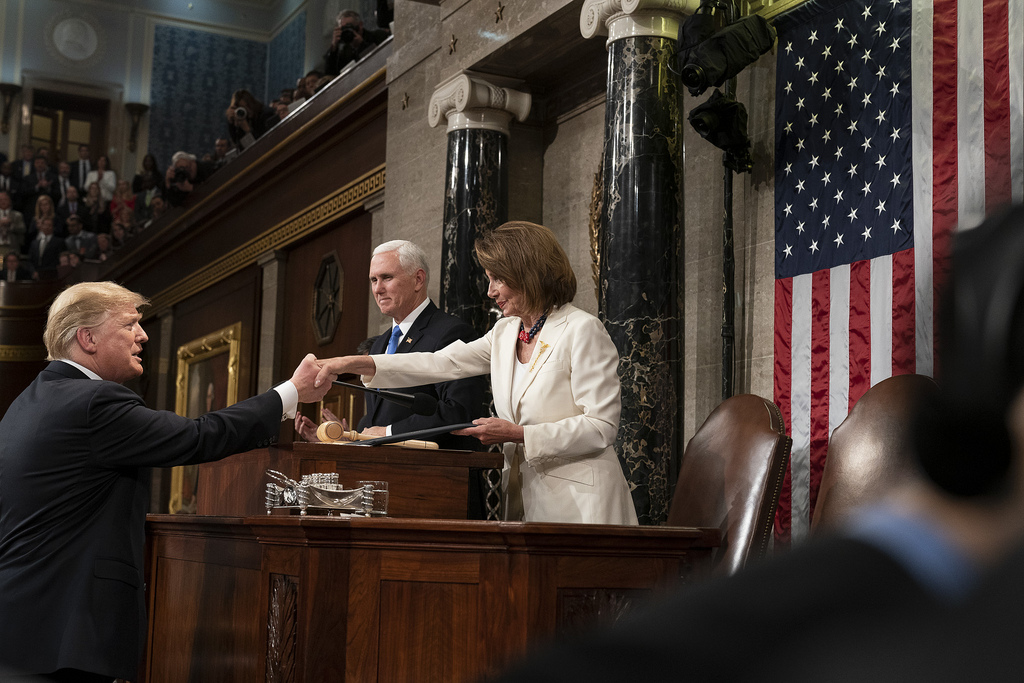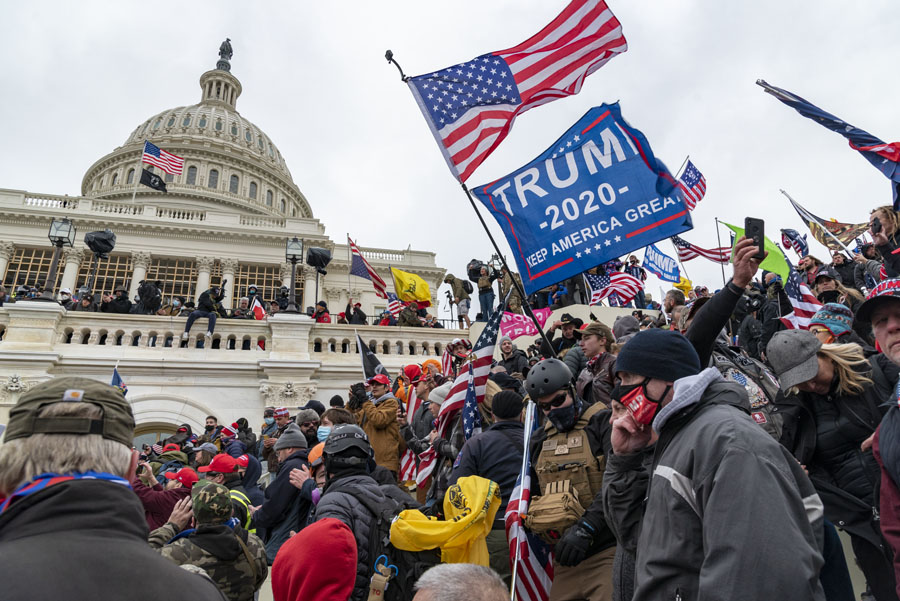Speaker Pelosi and the Norms of Impeachment
Speaker Nancy Pelosi has now joined Gerald Ford as a House leader putting on the record an influential view of the boundaries of impeachment. In 1970, when Ford was House minority leader, he spoke from the floor arguing against any boundaries at all: An impeachable offense, said the future president, was whatever the House decided that it was at any given time.

Speaker Nancy Pelosi has now joined Gerald Ford as a House leader putting on the record an influential view of the boundaries of impeachment. In 1970, when Ford was House minority leader, he spoke from the floor arguing against any boundaries at all: An impeachable offense, said the future president, was whatever the House decided that it was at any given time. Now, almost a half-century later, Pelosi was markedly more guarded in an interview with the Washington Post, advising that impeachments so divided the country that only “overwhelming” or “compelling” evidence, recognized as such by both Democrats and Republicans, could justify resort to this extraordinary constitutional remedy.
Some commentators have saluted the speaker’s political realism. The country is clearly polarized, and the president’s die-hard supporters reject any talk of impeachment as purely political and illegitimate. The 2020 election is around the corner, the logic goes, and the House has other mechanisms, such as vigorous oversight, to expose presidential misdeeds for voters to judge. Others worry that Speaker Pelosi went too far, that she created in some way a precedent, or at least a statement liable to be interpreted that way, and that she raised the impeachment bar dangerously high.
Whatever may be said about the merits of the speaker’s position, her remarks are certainly not “precedent.” They carry great weight but only in the current circumstances. They do not establish constraints on future Congresses any more than Ford’s remarks did. It is, moreover, not clear that what Pelosi said would hamper any move toward impeachment in the wake of evidence that is arguably “overwhelming” or “compelling.” Here, Ford’s view comes to mind: What passes for overwhelming or compelling is most likely whatever the House decides at any time.
Even the standard for bipartisanship that Pelosi articulated is open to reasonable interpretation. Some Republican support may be enough. (One example: the so-named Bipartisan Campaign Reform Act of 2002, sponsored by Republican Sen. John McCain and Democratic Sen. Russ Feingold, passed over majority Republican opposition in both chambers.)
However, Pelosi spoke after considerable debate for 18 months about impeachment: a stream of op-eds, several book-length treatments and punditry galore. There is no shrewder, more insightful or more accomplished senior political leader in America today. And so what she had to say could be viewed as a distillation of where practical judgments about the imperatives and limits of impeachment may have settled at this time. (This not to say, for the record, that the place at which we have arrived is satisfactory. I am among those who wish for much less reticence overall to hold presidents accountable through the impeachment process.)
Pelosi’s remarks tend to support a few broad conclusions about the state of the debate over—and the politics of—the impeachment process.
1. Impeachment is most likely if the president has committed serious crimes, and not all serious crimes are serious enough for this purpose. The speaker did not specifically say so, but a criminal offense, and one understood to be serious, certainly crosses the threshold of overwhelming or compelling. This president is Individual No. 1 in the Southern District of New York’s federal criminal indictment of Michael Cohen. It seems reasonably clear that Trump faces prosecution in that case when he leaves office and has lost the protection of Office of Legal Counsel opinions that immunize him only while he remains president. Yet Trump’s direct involvement in criminal activity has provided little support for even an impeachment inquiry. It has been widely seen as bearing only marginally on his fitness for office: It is “just a campaign finance case,” some say, which involves the very personal subject matter of payments to silence allegations of extramarital affairs.
2. Congress versus the special counsel: This is yet another modern impeachment controversy whose course seems largely contingent on the conclusions reached by a special or independent counsel. It appears that as a process matter, and especially in view of Pelosi’s concern with the divisiveness of the impeachment process, using a special or independent counsel process to overcome the partisan divide—to provide some benchmark of expertise or neutral judgment—may become standard operating procedure. Looking to some source of neutral fact-finding assumes special urgency in an age of a highly fractured, polarized and polarizing media environment of targeted communications in which news consumers feel increasingly entitled to their “own facts.”
Of course, the special counsel investigative process is itself controversial, as in the case of Ken Starr’s investigation of Bill Clinton in the 1990s and now again in the course of Trump and his allies’ attacks on the integrity of the Mueller investigation. Nevertheless, Mueller continues to enjoy markedly better trust numbers than does the president.
The continued embrace of a high threshold, which is mostly easily cleared by a credible finding of criminal misconduct, suggests that the role of a special counsel will remain central to the development and the fate of cases for impeachment. This points toward the importance and likelihood of a review and strengthening of the special counsel regulations. The proposals made, and not so far acted on, will be ripe for reconsideration in the years ahead.
3. The demagogue. One consequence of the focus on evidence of discrete legal offenses is to remove the president-as-demagogue from much risk of impeachment. Donald Trump has introduced the country to demagoguery in the Oval Office, traveling the road paved by the likes of Huey Long and Joe McCarthy to the highest office of the land. This critique of his leadership style is often couched in terms of his contempt for norms and willingness to shatter them.
Norms are part of the story but not all of it. The demagogue, as the founders pictured this type, is a ruthlessly self-interested schemer who lies and defies rules and norms as necessary to vilify his opposition. Just as the House of Representatives voted, but the Senate did not take up, an article of impeachment against President Andrew Johnson that cited his penchant for demagoguery, so it appears in the case of Donald Trump that he can carry on in demagogic fashion. Only the voters, not Congress, will decide how long he can continue on this course.
4. Impeachment versus elections. The steady democratization of the presidential selection process over the past 50 years is a major obstacle to removing a president by means other than the ballot box. Primary elections have replaced party conventions and closed-door bargaining in the choosing of nominees; party leaders and insiders do not “vet” or screen candidates. It is not surprising that many members of Congress—who have been pushed to the periphery of the presidential primary nominating process, now hanging on to restricted roles as “superdelegates”—feel keenly the political limits on their constitutional authority to oust a president who has been chosen by “the people.” This makes the impeachment a presidential election cycle an especially hard case in this day and age.
Despite it all, Donald Trump could well still face impeachment. The Mueller report could supply the compelling or overwhelming grounds, causing some Republican defections and the necessary degree of bipartisanship. Other scandals could break into the open. A new rash of mendacious, fecklessly self-serving presidential behaviors could spell the end to the tolerance of Trump’s demagogic leadership. But even if so, this norm-busting president has working in his favor certain other norms—namely, those that govern the choice of impeachment as the answer to presidential misconduct and abuse of power.





